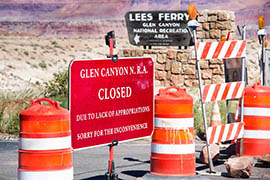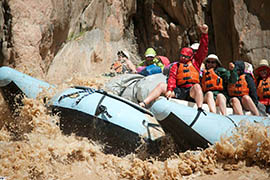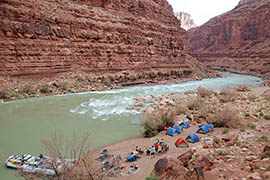Cronkite News has moved to a new home at cronkitenews.azpbs.org. Use this site to search archives from 2011 to May 2015. You can search the new site for current stories.
Northern Arizona tourism feeling impact of Grand Canyon shutdown
WASHINGTON – Grand Canyon river-rafting guides were having a good season this year. And then the calendar turned to October.
Rafting companies say they have lost hundreds of thousands of dollars in business since Grand Canyon National Park closed as part of the federal government shutdown on Oct. 1. In the 10 days since, six companies have had to cancel 12 trips, said John Dillon, executive director of the Grand Canyon River Outfitters Association, a combined loss of more than $900,000 so far.
“Everything was great until Sept. 30,” Dillon said.
Rafting is just one of the tourism businesses affected, directly or indirectly, by the closure of park, which has had a domino effect through the northern Arizona tourism industry, business owners said.
In the first 10 days of the shutdown, Grand Canyon National Park lost 120,000 potential visitors and the roughly $11.8 million they would have spent, according to an estimate by the Coalition of National Park Service Retirees.
In Flagstaff, considered the gateway city to the Grand Canyon, business owners have noticed a decline in sales, said Minesh Patel, president of the Flagstaff Lodging and Restaurant Association and owner of Country Host Restaurant.
Hotels, restaurants and others have all suffered because of the drop in tourists travelling through Flagstaff, Patel said. Country Host, which is located near Interstate 40, depends heavily on travelers who are visiting nearby parks.
For rafting companies that had to cancel expensive trips, even the first day of the shutdown was costly, Dillon said. But hotels and restaurants are holding out hope that if the parks reopen soon, there will not be too much damage.
Heidi Hansen, spokeswoman for the Flagstaff Convention and Visitors Bureau, said the shutdown’s impact on tourism has not “taken full effect” yet because so many visitors already in the Grand Canyon area are looking for other options. So far, the visitors bureau has mitigated some of the damage by helping tourists change their itineraries and visit other nearby attractions, Hansen said.
Patel agreed that despite the noticeable loss in revenue for hotels and restaurants, reopening national parks soon would mitigate much of the damage.
“If it were to happen immediately, and they open these back up, quite a bit will be salvaged,” Patel said. “Because for the reservations that haven’t been canceled yet, people will still come.”
The Department of the Interior announced Thursday that it will consider proposals from states to use their own funds to reopen national parks within their borders.
Arizona Gov. Jan Brewer, House Speaker Andy Tobin and Senate President Andy Biggs had written to President Barack Obama on Oct. 4 asking that the state be allowed to use its own resources to reopen Grand Canyon National Park, citing the park’s economic impact on nearby communities. Since the Thursday announcement, however, Brewer’s office has not said how the state might proceed on the Grand Canyon.
But for Alexandra Thevenin, and other rafting guides, the damage has already been done.
Thevenin, co-owner of Arizona Raft Adventures, said this is typically the time of year when rafters start to post a profit. But those companies have lost about 5 percent of their gross annual revenue because of the shutdown, she said, which wipes out their profits, bonuses, health-care reimbursement plans and other benefits.
Thevenin said her company alone has lost nearly $200,000 after canceling launches on Oct. 2, 4 and 8. Thevenin and others are trying to roll over as many reservations as possible to next year, but most customers have requested refunds, Dillon said.
Arizona Raft Adventures might have to take out a loan to cover offseason expenses, Thevenin said.
“The last part that helps us get through the winter is gone,” she said.









